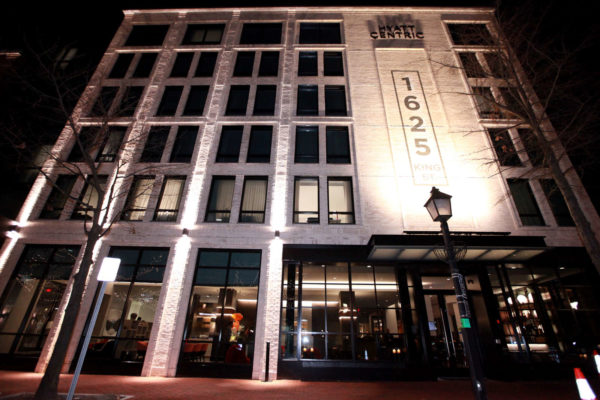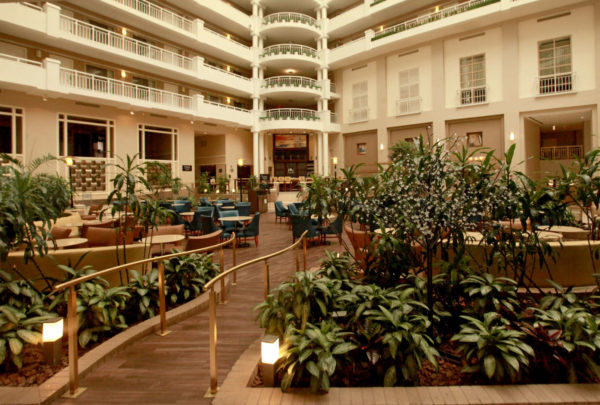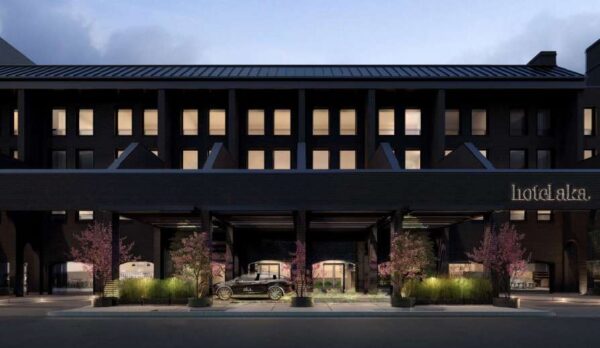
The Electra America Hospitality Group (EAHG) has filed an application to open a new cafe with outdoor seating at Hotel AKA — an Old Town North Holiday Inn replacement at 625 First Street with a dark exterior.
The amendment to allow a cafe is bundled in with an official change of ownership special use permit headed through the city review process.
The hotel is currently under construction and is scheduled to open sometime this winter. One of the most notable parts of the application process was the proposal to paint the exterior of the building fully black, though concept renderings on the Hotel AKA website show the exterior as a lighter grey.
“The Applicant is requesting a minor amendment to the existing SUP to add 40 outdoor dining seats,” the application said. “The Applicant is in the process of completing interior and exterior renovations to the existing hotel and plans to re-open as the Hotel AKA Alexandria.”
The new hotel will have 180 guest rooms with various amenities, including the new cafe if the permit is granted.
“The cafe will offer coffee, pastries, and similar beverages and light fare typically offered in coffee shops,” the application said. “The cafe will include a total of 40 outdoor dining seats in an outdoor seating area on First Street.”
The hotel will also include a lounge area and bar on the ground floor near the lobby. There are 148 parking spaces on-site, and the application said that’s expected to remain the same.
There’s a new reason to go to the Hyatt Centric Old Town.
Indo-Chinese restaurant Indochen is now open at the hotel (1625 King Street) serving breakfast, lunch and dinner. This is the second Indochen in Alexandria, after its location at 4906 Brenman Park Drive in Cameron Station.
The menu has been curated by Chef Ram Thapa, who is bringing his hometown food of Nepal to the restaurant’s tables. Diners can enjoy a traditional American breakfast, as well as lunch and dinner menus that include items like chop suey, chow mein, and Indian dishes like butter chicken, samosas and palak paneer.
“Along with the excitement of leading one of Alexandria’s newest hotels, I am thrilled to work alongside Chef Ram Thapa and bring a new energy to the lobby to create a refreshing experience for every guest,” says General Manager Sam Selvi. “With easy access to breakfast, lunch and dinner options, Indonchen enables visitors to discover cuisine that encompasses the best of Indian and Chinese culture.”
The space was previously home to French & Southern.
The new restaurant is open from 7 a.m. to 10 p.m.
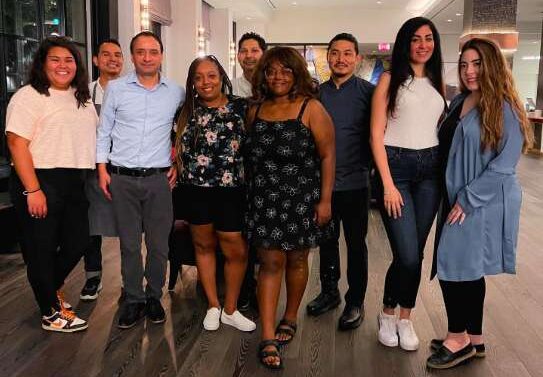

(updated at 4:45 p.m.) While more than half the hotels in Alexandria are pet-friendly, one hotel has added a package to go above and beyond for your furry friend.
The “Bark, it’s your Birthday!” package from Hyatt Centric Old Town Alexandria figuratively rolls out the red carpet for your pooch.
The package that comes at a price of $250 ensures Fido’s favorites are awaiting him at your hotel stay. Ahead of check-in, the hotel will call the dog parents and ask about all the pet’s tail-wagging favorites from treats to toys, and deck out the room with the assistance from local “bonetique” The Dog Park. Also included in that additional fee is a pet-friendly itinerary created by the hotel.
Visit Alexandria says that there are more than 2,000 pet-friendly hotel rooms in the city. And there’s plenty for owners to do once they do get to Alexandria with their best furry friend from pet-friendly patios, dog happy hours, pet salons and doggie gyms.
Alexandria is known for its pet-friendly accommodations. U.S. News and World Report lists the top four hotels in Alexandria for Fido as The Lorien Hotel & Spa, The Alexandrian Old Town Alexandria, Morrison House Autograph Collection and the Westin Old Town Alexandria. Hyatt was not included — Perhaps next year.
The U.S. News list includes hotels where pets stay for free by taking into account “amenities, reputation among professional travel experts, guest reviews and hotel class ratings,” according to its website.
Hotels nationwide are embracing amenities that cater to dogs. During the Covid pandemic, many people stuck at home adopted pets and many in the travel industry, eager to capture an increased demand, have leaned into making it easier for people to travel with pets.
“The pandemic created just the right recipe for an uptick in pet-travel,” a spokesperson for the Hyatt stated. “Starting with the puppy adoption boom during the initial weeks of lockdowns and the stay-at-home orders that followed, parting with a pet seemed more dreadful than ever. On top of that, COVID led to a decline in air-travel, the most difficult type of pet-travel, and an increase of more accommodating modes of transportation such as road trips.”
Hilton’s CEO said on an earnings call last year that he hoped the surge in pet ownership would help the hotel chain appeal to those would be customers through a partnership it announced with Mars Petcare in an effort to make its hotels more pet friendly, according to the Washington Business Journal.
Pandemic sounds death knell for Alexandria dry cleaners — “Gary and Chong Whitesides had for the past three decades run a dry-cleaning business in Alexandria… but the pandemic eventually shut them down, too.” [Washington Post]
Robots take over Hybla Valley Denny’s — “A handful of Denny’s restaurants nationwide, including one in the Alexandria area, has hired robots.” [Alexandria Living Magazine]
One dead, two badly injured in Duke Street crash — “One person died and two others were badly hurt in a five-vehicle crash that closed a section of Duke Street in Alexandria, Virginia, for more than eight hours in the overnight hours.” [WTOP]
IndoChen opening on King Street — “IndoChen is opening a second location inside the Hyatt Centric Hotel at 1625 King St. near the Old Town metro station.” [Zebra]
Alexandria hotels are still hurting, but there may be some signs of relief on the horizon.
The ongoing battering of the hotel industry by Covid has been one of the biggest talking points in the budget so far: particularly because city leaders say it could lead to more tax pressure on the city’s residents.
Visit Alexandria COO Tom Kaiden said while recovery has been slow, some aspects of the hospitality industry could return to nearly pre-pandemic levels this year, while others will take longer to recover.
“There’s no question that a whole host of issues have impacted the sector,” Kaiden said. “the ongoing nature of the pandemic, the recent spike of omicron, the reduction in business travel, the supply chain and labor challenges, inflation — all of those are headwinds the sector has faced.”
Pre-pandemic, Kaiden said the occupancy numbers were tracking at record levels. Trajectories charted in late 2019 and early 2020 projected hitting record occupancy in summer 2020 — but that obviously didn’t happen. That spring, hotel occupancy dropped to 8%.
Kaiden said while the city saw a dramatic reduction in occupancy rates early in the pandemic, there have been some signs of recovery over the last year. The occupancy rate is back up to 53% compared to 34% this time last year.
“There’s national data that looks at the composition and forecasting what they think will happen,” Kaiden said. “We’ve been looking at data from Oxford Economics [that says] leisure will be back to normal in 2022 but business travel won’t recover until 2024. Long term view is business travel will recover but we’re still a few years away from that. This year we’re expecting business travel to be down 24%.”
Kaiden said that while people are ready to travel again, companies tend to be more reticent.
“Individuals seem ready to travel again, we’re seeing that in consumer confidence in the desire to travel,” Kaiden said. “They might not be wanting to travel in January, but they were still dreaming to travel when the immediate variant subsided. Individuals make that choice for themselves more freely. Employers are more risk-averse, more reticent, and are using tools like Zoom and hybrid meetings.”
While Kaiden said those are useful short-term strategies, the city is banking on in-person business travel eventually coming back. While the long-term effects of COVID on office space usage are unknown, Kaiden said in-person meetings have a value that can’t be fully replicated online.
Beyond COVID, one of the other major shake-ups in hospitality has been the rise of alternative lodging like Airbnb. The city started authorizing and collecting taxes from transient lodging in 2018, though that kind of lodging also took a hit from the pandemic. In terms of impact on local hotels, Kaiden said transient lodging doesn’t have as much of an effect in Alexandria as it might in other tourist destinations.
“We’ve seen Airbnb rise nationally but it is more of a long-term stay alternative, so their prevalence in markets like the DC metro… the impact is not as great here as it is in traditional mountain and beach destinations,” Kaiden said. “So yes, Airbnb is a factor, but less so here and honestly hotels are adapting their offerings and are essentially more nimble.”
In response to both Covid and transient lodging options like Airbnb, Kaiden said hotels are shifting to focus around guiding visitors around the locality as much as providing a room.
“Our hotels are very good at working with guests to guide the guest experience and make sure they get the most out of their stay,” Kaiden said. “At Visit Alexandria we work with them on a key city attractions package, which encourages people to get out in the community and explore museums. That level of personal service and the added benefit of the inclusion of attractions gives visitors a deeper, richer experience and enables them to get out into neighborhoods and discover the city in the way an unguided experience — like staying in an Airbnb style property — just isn’t as rich.”
In a glimpse at financial assessments for 2022, Alexandria Mayor Justin Wilson said on Twitter that declining hotel revenue — and thus taxes paid to the city — will put more of the city’s tax burden on residents.
The decline of tax revenue for the City of Alexandria is just one part of a difficult financial recovery from the pandemic — one exacerbated by the omicron surge earlier this winter. While sales and meals tax have rebounded slightly, the dearth of hotel funding has even led the city to consider investing in a new hotel.
“In 2019, there were 31 hotel properties in the City of Alexandria worth a total of $753 million,” Wilson said. “Today, those 31 hotel properties are assessed at a total of $464 million.”
That’s a 38% drop in the value of hotel properties in the city.
The tax revenue generated by the City’s travel and hospitality industry significantly eases the impact on our residential taxpayers, so: yes.
— Justin Wilson (@justindotnet) February 2, 2022
Meanwhile, Wilson said average assessments on single-family homes and condos have increased city-wide.
More 2022 Alexandria Assessment Data:
Increases were consistent around the City
The average single-family home increased 6.44% to $896,176 (97% increased)
The average condo home increased 2.81% to $398,470 (65% increased) pic.twitter.com/6CZuS4PIOJ
— Justin Wilson (@justindotnet) February 2, 2022
The real property assessments are scheduled to be reviewed at a City Council meeting on Tuesday, Feb. 8. A report prepared for the meeting indicates that the gulf between the commercial and residential tax base could widen this year.
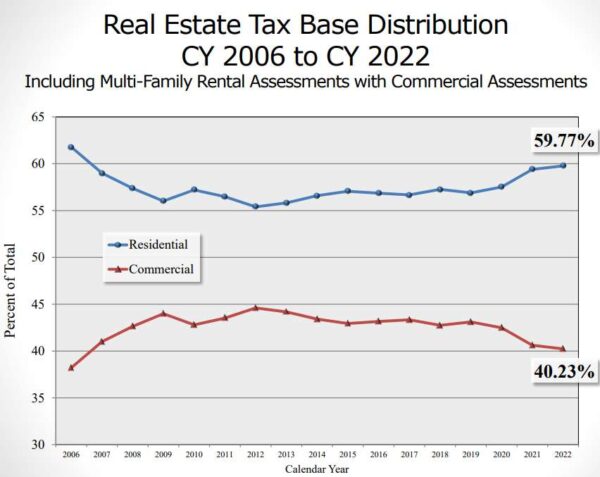
The report said there’s been a $915.86 million growth in commercial assets in Alexandria, with a 15.36% increase for warehouses and a 10.33% increase for apartments offsetting a 12.5% decline in commercial assets for hotels and 6.47% decline in shopping centers.
On Tuesday night, Council will receive our real estate assessment report.
Our tax base grew by 6.24%, the highest growth in 16 years.
A third of that growth was from new development and the rest from appreciation.
Residential increased by 6.91% and commercial by 5.34%. pic.twitter.com/UaSuLyoYke
— Justin Wilson (@justindotnet) February 2, 2022
The Electra America Hospitality Group sees Alexandria’s red brick facade and wants it painted black.
The Holiday Inn Express in North Old Town could be rebranded to Hotel AKA as the hotel appears to move into an emo phase. A request for alterations to the Board of Architectural Review (BAR) includes a number of changes for the hotel at 625 First Street and 510 Second Street, perhaps most notably a new coat of black paint on the brick facade.
“The Applicant is proposing to re-brand and renovate the existing hotel,” the application to the BAR said. “the Proposed renovations include the demolition of limited portions of the facades and certain building features, but the building itself will remain. A number of exterior alterations are proposed to enhance the appearance of the building.”
The building is notably not historic, having been constructed in the 1970s, so the application said there’s no design or textural grounds for rejection. There will also be no changes to the height, mass or scale of the building.
“The existing brick facade will be repainted black,” the application said. “The proposed color will integrate the brick facade with other proposed building materials which include a metal standing seam roof, metal window frames, and metal guardrails and trellis features. The proposed brick color is compatible with existing buildings in the immediate vicinity of the Property.”
Other changes include the replacement of the shingled roof with a metal one, cutting down the vehicular drop-off area new entrance canopy and more.
“The exterior alterations represent improvements to the existing facade that will result in a more attractive and aesthetically pleasing appearance,” the application said.
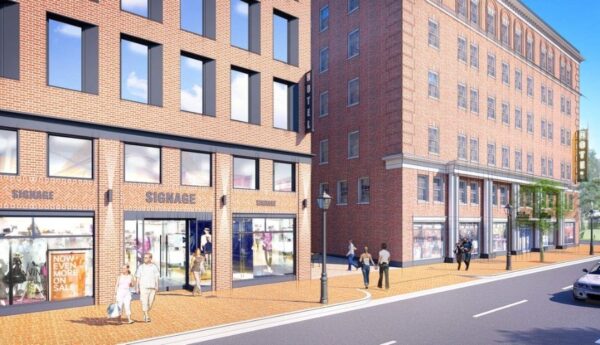
Alexandria’s City Council voted to approve a partially city-funded hotel project at 699 Prince Street despite opposition from community labor activists.
The project drew some attention for the city involvement in funding — 1% of the tax revenue generated by the project will be paid back to bond trustees — but at the City Council meeting on Saturday, the majority of the discussion centered around how the city should use its involvement to push for better labor practices.
The City Council chambers were filled with local labor activists opposing the project, though some trickled off at the discussion brought up the end of an eight-hour meeting. Those that stuck it out to remain for community comment reiterated concerns that the city was getting involved with a project that would not offer an adequate living wage for employees.
“We believe bringing in a virulently anti-union hotel project being constructed with no labor standards is not a good thing for the working class of this city,” said Virginia Diamond, President of the Northern Virginia branch of the American Federation of Labor and Congress of Industrial Organizations (AFL-CIO). “I appreciate the work that has gone into a complete apparent change in your policy — which now for the first time takes into account the impact on working people, but it has a long way to go. Neither the developer nor the hotel owner were willing to speak with the union.”
Diamond said labor organizers were hoping for more protections, like prohibiting labor brokers and offering apprenticeship programs so Alexandria residents can work their way into middle-class careers.
The city did add some labor protection measures, like conditions for construction monitoring designed to curb wage theft, but the changes fell short of what activists had hoped for.
AEDP President and CEO Stephanie Landrum said the hotel project would offer a “what I would consider a very competitive array of benefits” including paid time off, paid time to volunteer, healthcare and 401k plans.
“Projects like this are years in the making so multiple times we do check-ins… so we don’t get to a point where we bring a project to you for approval and there are new things introduced,” Landrum said. “For a variety of reasons beyond our control, that didn’t happen here. So we’re at a point where we have a project that meets every requirement in place when we put it together and we literally got to the last step and brought it to you and a number of new issues were raised. If we push on some of these issues further, the project becomes not feasible for the development team.
While the City Council ultimately voted approval, even those who voted in favor of the project said the worker compensation discussions around the project were a good step forward and more work needs to be done to update the city’s labor standards.
“I think what I’ve seen of the last 11 days is a very big, good step to where we need to grow,” Chapman said. “I’m excited about the colleagues who have stepped up and talked about worker rights. No offense to my former colleagues, but that wasn’t happening in 2012 and 2013. To get our city processes caught up with our Council will take not a lot of time, but we have a lot of minds to change within our community and those conversations, whether it be with AEDP, Visit Alexandria, and other taxpayer groups — we need to bring those groups up to speed. If this is the new way, and I think it should be, those conversations have to take place so everybody is on the same page.”
Chapman specifically praised City Council member Alyia Gaskins, who was the first to raise the topic at the initial City Council review. But Chapman also said the project was a rare low-risk opportunity to boost commercial revenue in the city.
“I’m kind of looking at how we are bringing in commercial revenue,” Chapman said. “That’s something from the last couple years of the pandemic, even with this last term on council before the pandemic, was something we on Council need to be sharpening our pencils for. I was disappointed when we as a city shifted away from trying to hit a goal of 50/50 commercial/residential revenues because I do think that will lessen the burden on our homeowners and renters… This seems like an opportunity to increase that commercial revenue that we bring in.”
Those who opposed the project said labor was the key insurmountable issue.
“The discussion around this project has been pretty frustrating until today when we finally honed in on the real issue,” said City Council member Kirk McPike. “So much of the early discussion was about financing concerns that didn’t really reflect the reality of the project on the ground. This was a good model, where projects under this tourism zone only eat a little bit of what they grow. This project would be a slam dunk if it wasn’t for labor issues. We as a city need to get more serious about building up and protecting working families in our city and doing what we can under Virginia law to support unions in organizing efforts is a key way to do that.”
Both McPike and Gaskins said the labor discussion around the project signaled the start of a shift in the city’s viewpoint on these issues.
“We didn’t get what we want, what the people who will work at this hotel deserve,” McPike said. “We have put a flag in the ground and made it clear to future applicants that this is not a question that can be ignored, and I expect us to expect more in the future… I do think we have achieved something real here. This is a half-step and I hope the next project we look at is a full step forward with where we want to be on labor rights.”
“We put a stake in the ground that says we’re ready to have this conversation,” said Gaskins. “Progress was made on things the development team talked about. Yes, we’ve made some progress, but I’m struggling with where we didn’t get to.”
The City Council approved the project in a 4-3 vote, with Gaskins, McPike and Sarah Bagley voting in opposition.

Local labor representatives have come out in force against potential city funding in the development of the Hotel Heron in Old Town.
A proposal spearheaded by the Alexandria Economic Development Partnership (AEDP) would have the city take some of the tax revenue generated by the Hotel Heron project at 699 Prince Street to pay the project’s bond trustees.
Interior demolition was already underway when the pandemic scared off hotel investment, but an AEDP report indicates that with the city’s loss of hotels over the last few years there isn’t enough of a local market to meet the potential tourism demands if and when that rebounds. A report from AEDP to the City Council said the investment was low risk because the only city money put into the project would be taxes generated from the hotel.
During initial City Council discussions earlier this month, city leaders seemed amenable to the project, although wanted to see progressive standards set and compensation adequate enough for laborers and hotel workers to afford to live in Alexandria. A project presentation also boasted that it would create 19 full-time jobs and 90 part-time jobs.
In the days since the meeting, organizers from various labor groups around Alexandria told ALXnow they expect city involvement in financing the project to come with stronger guarantees of fair pay and treatment of employees.
“The Council should oppose this project,” said Bert Bayou, Director of African Communities Together. “As an organizer of African immigrants in Alexandria, I believe that this money should help keep people in their homes. Creating bad jobs does the opposite, exacerbating the housing crisis and leading to further poverty and hardship.”
The push for higher wages comes after more than a year of protests against evictions following job loss during the pandemic.
“Living in Alexandria is expensive — even if you are making decent wages,” said Southern Towers tenant and organizer Sami Bourma. “If the Council approves this project, they should be ashamed of themselves. They should be standing up for workers like me and creating jobs that help us, not a bunch of part-time jobs that families can’t survive on.”
“Approving this project would be an insult to Alexandria workers,” said Sam Epps, Political Director of UNITE HERE Local 25. “How can the Council justify using taxpayer dollars to subsidize a project that creates just nineteen full-time jobs? Workers coming out of this brutal pandemic deserve better.”
Stephanie Landrum, president and CEO of AEDP, said the project will not only be a sorely needed revenue boost for Alexandria, it will also be a showpiece historic renovation. The building was previously the Hotel George Mason at the entrance to Old Town.
“Tourism is a vital part of Alexandria’s economy,” Landrum said. “Supporting the renovation of a historically significant building at such a prominent location in our historic district today and positioning ourselves to meet and even grow hotel demand as it rebounds is an important tactic in Alexandria’s pandemic recovery. This project also has returned the building to the City’s real estate tax rolls for the first time in at least a generation. The previous office tenant was a nonprofit with a federally-granted tax exemption.”
Landrum said the project was first approved several years ago and demolition started in March 2020, but the developers approached AEDP for help with a funding shortfall caused by the pandemic. The proposed city’s financing also takes up a relatively small portion of the project’s overall cost, so an increase in pay for staff would require the developer to secure funding elsewhere — a prospect that seems unlikely given the need to turn to the city for help in the first place.
“Those challenges continue, which means that any increase in cost, increases the gap needed to be closed by an equal amount,” Landrum said. “Without identifying additional capital or resources, substantive cost changes make the project not feasible.”
Landrum also said the hotelier was chosen as a partner in part because of their paid benefits to employees, wage transparency, opportunities for growth, and their other pro-worker policies already in place.
In regard to public funds being used for the project, Landrum said there’s no city policy in place that requires labor agreements when public funds are used.
“The Council will be discussing this as they consider their own construction and investment projects, as they do not currently require labor agreements, and we would expect that once a policy is in place for the City, it logically will extend to projects they chose to financially participate in,” Landrum said.
Landrum also said AEDP worked with city staff and the developer along previously established city requirements and changing those last-minute as the project comes forward could put it in jeopardy. The explanation is a little complicated, so it’s presented in full below:
For the Hotel Heron project, AEDP, the City staff, and the developer engaged with the state and negotiated this deal according to the terms and requirements that are currently in place. Meaningfully changing a policy for an approved and welcomed project has created a challenging situation that has put the viability of the project in peril. Our role is to explain the impacts of these changes, advocate for the approval of this great project on its merits and work with our elected leaders to set new policies that are clear for new projects moving forward.
To your question about feasibility, labor requirements, prevailing wages, collective bargaining agreements all have implications on a project’s bottom line, so any business or developer needs to understand those costs at a project’s inception to be able to adequately budget for them.
Ultimately, there are no provisions at the state or local level that require labor agreements to qualify for this incentive program. Under Virginia law, the City does not have the power to set its own prevailing wage, but we do support efforts to create one at the state level, as outlined in the City’s legislative agenda for the upcoming year. The conversation about including this requirement is under discussion because we are considering public investment- as explained above, and discussed with recent projects like Landmark Mall, staff’s role is to provide information about the feasibility of making changes, and to outline any costs or implications those changes might have on the project, so that Council can make informed policy and project decisions.
If the City Council wishes to make labor agreements a condition of our participation in this state incentive program, it is up to council members to follow the usual decision-making process to hear from City stakeholders, debate the pros and cons of that decision, and adopt and communicate any resulting requirements. And, of course we would follow applicable laws, regulations, and requirements when pursuing projects, as we currently do.
Alyia Gaskins was the City Council member who first raised questions about fair compensation for employees during the City Council discussion and said she hasn’t fully decided how she will vote but treatment of workers on the project will play a role in her vote.
Since my first Council meeting, I have raised issues from wage theft to worker protections to how economic development benefits small businesses. Unions are about more than wages and benefits they are also about working conditions and the right to have discussions about issues that impact you. The reason I am so focused on preserving the rights of workers is because I believe they are in the best position to articulate what is fair compensation. I don’t presuppose my judgment on these cases so I cannot answer the question about how it will impact my vote. We have time before Saturday. I look forward to working with the developer to find a solution. Ultimately, we have to get to a point when we have greater predictability for all in the development process.
Project zoning and the city’s financing role are scheduled for a vote at the City Council meeting tomorrow, Saturday.
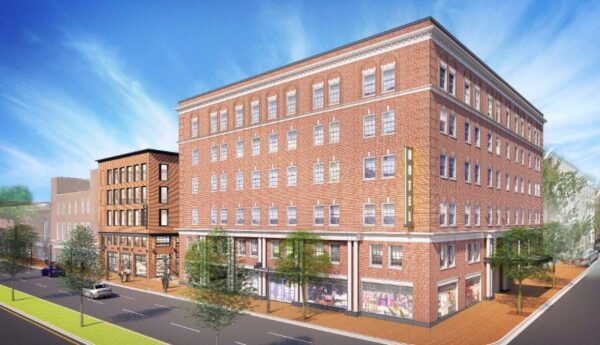
Alexandria has been bleeding hotels and local economic and tourism experts said if Alexandria wants to fully capitalize on a post-COVID tourism boom, it needs to pitch in on a new hotel.
At a meeting last week, the City Council expressed cautious enthusiasm about a proposal that Alexandria put a little of its tax revenue from the hotel back into the developer’s coffers. The proposal involves offering incentives to help finance the development of a luxury hotel at 699 Prince Street.
AEDP CEO Stephanie Landrum said the financing structure being proposed limits the risk involved for the city. The city, through AEDP, would pay bond trustees out of a 1% cut of the sales and use tax generated by the hotel after the project is complete and begins to generate revenue. The project is estimated to generate roughly $2 million annually in revenue, which Landrum said was a “significant amount of money” for the city to come from one project.
But there are still concerns about the city being involved in financing a private hotel development. The City Council wasn’t opposed to the project overall on first reading, but Alyia Gaskins said the city should put in work to ensure laborers at the project are paid fairly and treated equitably.
The project is scheduled for final review at a public hearing on Saturday, Jan. 22.


